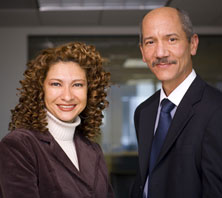 Overview Fair Wisconsin Education Fund Philanthropist, Linda Ketner GLAAD Legacy Fund Movement Advancement Project Pikes Peak Library |
Gay & Lesbian Alliance Against Defamation (GLAAD) Monica Taher and Pedro Rojas Photo courtesy of Ray Ng As editor of the Spanish language daily newspaper La Opinión, Pedro Rojas has long covered the Los Angeles area's homeless population. A visit from the Gay & Lesbian Alliance Against Defamation (GLAAD) helped his newspaper find a new and important angle on the problem. "They told us a lot of younger people run away because they cannot confront their families," Rojas explains. "So much in our culture cannot accept a son who is gay or a daughter who is a lesbian." La Opinión writers interviewed young gay homeless Latino immigrants and discovered that many of them found the freedom to come out of the closet to be who they really are--but ended up at least temporarily homeless because of the shock to their families. "GLAAD has helped us a lot in the way we cover the gay and lesbian community," says Rojas. "Last year they gave us a couple of seminars and workshops for the whole newsroom. They've given us information, booklets, and contacts to work on stories." La Opinión, with a daily circulation of 124,000, was nominated for three Spanish language GLAAD Media Awards in January for its coverage of lesbian, gay, bisexual, and transgender people. One nomination was for an article called "Doble Dia de los Padres" about two fathers and their three adopted children. GLAAD President Neil G. Giuliano, said the organization has worked for more than five years on heightening the visibility of communities of African descent, Spanish speakers, and Asian-Pacific Islanders in the U.S. media as a key part of its mission. GLAAD works to promote fair, accurate, and inclusive representation of people and events in the media as a way to eliminate discrimination based on sexual orientation. "It's important because these are communities where stereotypes are very pervasive and the visibility we can bring changes and shatters stereotypes," Neil says from the group's New York office. "We hope to achieve a broader understanding and less surprise when LGBT issues among people of color are more visible."" GLAAD's People of Color Media Strategy Program has been integrated into everything the organization does. "We make change by being inclusive and practicing what we preach," Neil says. "It's a thread that runs through our work and everyone has a responsibility to be sensitive and inclusive." Mónica Taher, who spearheads the People of Color Media Strategy team from Los Angeles, works closely with GLAAD programs that focus on national news and entertainment. Thus, if a news show is looking for a couple to talk about gay marriage, she is likely to seek an African-American, Latino, or Asian couple to feature. The group's work also includes education, such as the seminars held for Pedro and his staff. Sometimes the process is as basic as explaining the difference between transvestite and transgender. Often it entails talking about family and culture. When GLAAD representatives sat down recently with executives from Johnson Publishing, the nation's largest black-owned media enterprise, Mónica notes they discussed sensitive terminology as well as the cultural nuances and religious traditions in black communities that pose challenges in covering LGBT issues. The learning goes both ways. Mónica notes that GLAAD realizes it needs a Chinese language media reference guide and is working on one this year. "We can't expect the Chinese language media to understand our issues if we don't talk in their language," she points out. The work is paying off in far fewer cases of defamation that GLAAD challenges, and more people of color showing up in both mainstream and LGBT media. "We have noticed tremendous changes in how the Spanish language media covers LGBT issues and in the way the African-American press covers them," Mónica says. "When we do things wrong, they send us notes," Pedro explains. "We have not received one of those notes for a long time -- and that means we are doing good!" |
|||
Gill Foundation | 2215 Market Street | Denver CO 80205 | 303-292-4455 ph | 303-292-2155 fax
| ||||
